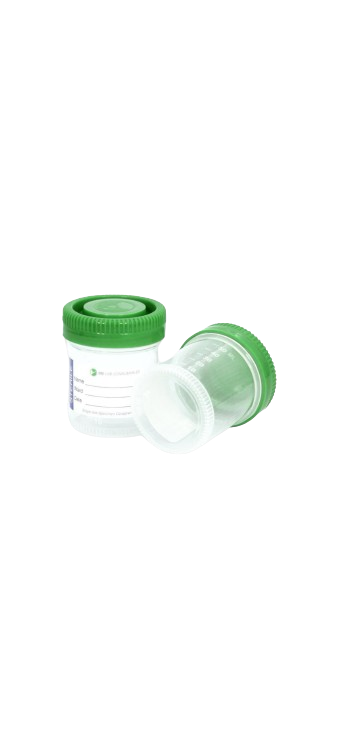A urine container, also known as a urine collection cup or specimen container, is a sterile, leak-proof container designed for the collection, storage, and transport of urine samples. These containers are commonly used in medical laboratories, clinics, hospitals, and at-home testing for diagnostic purposes. Here’s a detailed description:
Key Features:
- Material:
- Typically made from high-quality, medical-grade plastic (e.g., polypropylene or polystyrene) that is durable, non-reactive, and safe for urine storage.
- The container is usually transparent, allowing for easy visual examination of the urine sample.
- Capacity:
- Urine containers come in various sizes, with common capacities ranging from 30 ml & 50ml.
- Design:
- Wide Opening: The container has a wide mouth to facilitate easy collection of urine without spillage.
- Screw-Top Lid: Equipped with a secure, screw-on lid that prevents leakage and contamination during transport.
- Graduations: Many containers feature measurement markings (graduations) on the side, allowing for accurate volume measurement.
- Labeling Area: A designated area or label is often provided on the container for patient information, such as name, date, and test type.
- Sterility:
- The containers are usually provided sterile and sealed in individual packaging to ensure they are free from contaminants before use.
- Usage:
- Diagnostic Testing: Used to collect urine samples for various tests, including urinalysis, culture, pregnancy tests, drug screening, and more.
- At-Home Collection: Sometimes provided to patients for at-home sample collection, which is then returned to a lab for analysis.
- Additional Features (Optional):
- Some containers may include integrated temperature strips for immediate temperature checks.
- Others might have a spout or a funnel to assist in transferring the sample to other test kits or containers.
Common Applications:
- Routine Medical Examinations: As part of regular health check-ups.
- Pregnancy Testing: To confirm pregnancy through urine-based hCG tests.
- Drug Screening: To detect the presence of drugs or their metabolites.
- Infectious Disease Testing: For diagnosing infections like urinary tract infections (UTIs) or sexually transmitted infections (STIs).
Handling and Disposal:
- After Use: The container should be securely sealed to prevent leakage.
- Disposal: Once the urine sample has been processed, the container is usually disposed of according to medical waste guidelines, especially in clinical settings.





Reviews
There are no reviews yet.